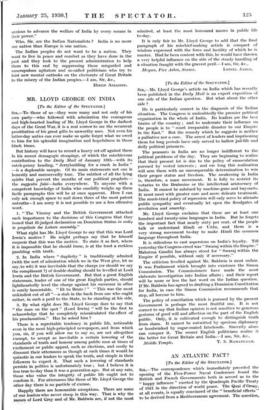[To the Editor of the SPECTATOR.] SIR,—Mr. Lloyd George's article
on India which has recently been published in the Daily Mail is an expert exposition of one side of the Indian question. But what about the other side ?
He is particularly correct in the diagnosis of the Indian situation. The Congress is undoubtedly the premier political organization in the whole of India. Its leaders are the best brains of the country ; and to underrate their influence on the people is to " court irreparable disaster to our Empire in the East." But the remedy which he suggests is neither a palliative nor a cure. The arrest of leaders and imprisoning them for long periods have only served to hallow jail-life and deify political prisoners.
The peasants in India are no longer indifferent to the political problems of the day. They are beginning to realize that their present lot is due to the policy of emasculation pursued by vested interests ; and ere long this realization will arm them with an unconquerable determination to win their proper status and freedom. The awakening in India is, therefore, a mass movement. It is folly to restrict its votaries to the Brahmins or the intellectual aristocracy of India. It cannot be subdued by machine-guns and bayonets. It must meet with greater care and more delicate treatment. The much-tried policy of repression will only serve to alienate public sympathy and eventually let open the floodgates of revolution and anarchy.
Mr. Lloyd George exclaims that there are at -least one hundred and twenty-nine languages in India. But he forgets the important fact that nearly sixty per cent. of the people talk or understand Hindi or Urdu, and there is a very strong movement to-day to make Hindi the common language throughout India.
It is ridiculous to cast aspersions on India's loyalty. Till yesterday the Congress-creed was " Swaraj within the Empire." Mahatma Gandhi has always stood for " Swaraj within the Empire if possible, without only if necessary."
The criticism levelled against Mr. Baldwin is most unfair. It was Parliament which brought into existence the Simon Commission. The Commissioners have made the most elaborate investigation into Indian affairs ; and their report will be more or less the last word on the Indian question. If Mr. Baldwin has agreed to drafting a Dominion Constitution for India, in case the Simon Commission recommends that step, all honour to him.
The policy of conciliation which is pursued by the present Government is perhaps the most fruitful one. It is not correct to say that Indian opinion is not sensitive to generous gestures of good will and affection on the part of the English public. Only, it is cultivated enough to distinguish truth from sham. It cannot be outwitted by specious diplomacy or hoodwinked by sugar-coated falsehoods. Sincerity alone can conquer it. The sooner English politicians realize it the better for Great Britain and India.—I am, Sir, &c.,






































 Previous page
Previous page